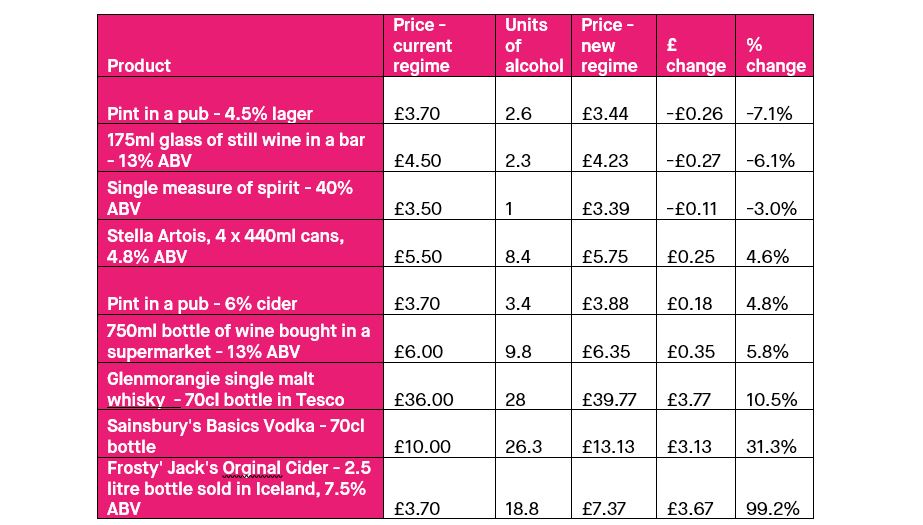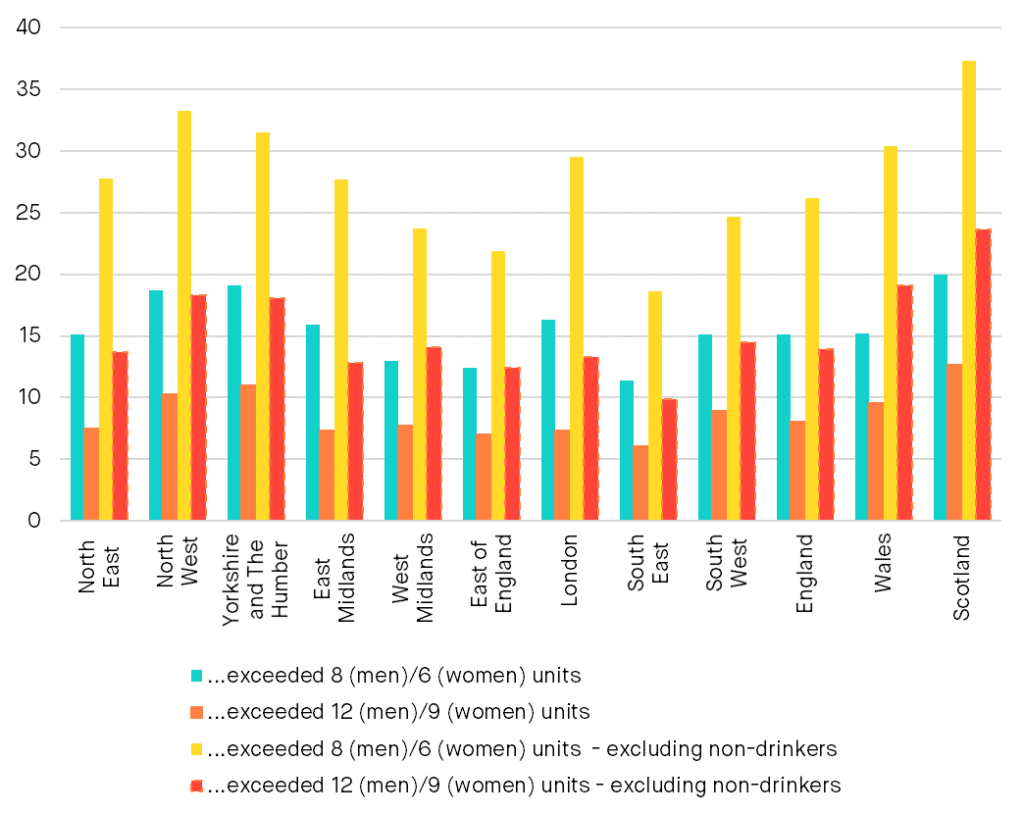Use Brexit to shake up “irrational” alcohol duty system, think-tank says
- Same-strength alcoholic drinks should be taxed at the same rate.
- A “duty strength escalator” should be introduced to encourage the production of lower strength beer, cider, wine and spirits.
- A new “Pub Relief” should be introduced, post-Brexit, to favour drinking in pubs rather than at home or on the street.
Duty on alcohol should be dramatically overhauled so that the stronger a drink is, the more tax it incurs, a think-tank says today.
The Social Market Foundation said that existing duty rules are inconsistent and unfair, and make some drinks such as high-strength cider unjustifiably cheap.
The cross-party think-tank proposed a shift in the burden of taxation towards high-strength drinks bought for consumption at home, and away from weaker products bought in pubs and bars.
In a new study, the SMF found the current duty regime is irrational and inconsistent, imposing different levels of duty on the alcohol in different products. At present, the alcohol in a 6% cider is taxed at just 7p per unit, but a low-strength wine, also at 6% alcohol content, incurs 50p of duty per unit.
To resolve such inconsistencies and discourage harmful heavy drinking, the SMF proposed reforms of duty rules that would increase the price of low-cost high-strength cider bought from shops by almost double but slightly reduce the price of beer bought on pubs. The report also calls for alcohol taxation to be “depoliticised” and guided by regular expert reviews of the harms caused by excessive drinking.
The SMF report highlighted EU rules that currently limit UK ministers’ scope to implement a more rational alcohol duty policy, suggesting that Brexit might make it easier make reforms.
A new “strength duty escalator” would mean that the duty per unit of alcohol rises with the strength of the product. Some manufactures are already reducing alcohol content in drinks to follow changing consumer tastes. The SMF said its escalator policy would reward such changes and encourage others to follow.
The SMF also proposed a new “Pub Relief” scheme allowing pubs to claim relief on alcohol excise duty. That could cut prices in pubs and focus alcohol duty on the off-trade, which is particularly reliant on sales to hazardous and harmful drinkers. EU directives currently mean that such a Pub Relief is not possible.
Strong cider bought from shops would be hardest hit by the proposed duty rise. Currently, a 2.5 litre bottle of cider at 7.5% — containing 18.8 units of alcohol can cost just £3.70. The strength duty escalator proposed in the report could push that price to £7.37, a 99% rise.
On the other hand, the price of a pint of 4.5% lager in a pub could fall from £3.70 to £3.44 (SEE TABLE). This is under a reformed duty regime that would raise the same amount of revenue as is the case at present – about £12bn per year.
The SMF report was sponsored by the Institute for Alcohol Studies. The SMF retained full editorial independence.
SMF calculations show that the richer a person is, the more likely they are to drink. Almost one in three (28%) of people in the lowest income bracket do not drink any alcohol. By contrast, only 6% of people earning more than £40,000 a year are non-drinkers.
Scott Corfe, SMF Research Director and author of the report, said:
“The way we tax alcohol today is a mess. Inconsistent, irrational duty rates based on politics and special pleading mean drinks closely associated with serious medical and social harm are unjustifiably cheap.
“A consistent, well-planned duty regime could discourage the riskiest drinking, support the pub trade and reward manufacturers who reduce the strength of their products. Alcohol should be taxed on the basis of evidence, not politics.”
Katherine Severi, Chief Executive of the Institute of Alcohol Studies said:
“This new report from SMF highlights the illogicality, loopholes and perverse incentives that pervade the way we tax alcohol. For too long, politicians have set alcohol duty with more concern for newspaper headlines than the health and welfare of the country. We therefore welcome SMF’s proposal that alcohol taxes should be set on the basis of a rigorous independent evidence review every 5-10 years.
“Post-Brexit, if the UK is no longer bound by EU Directives on alcohol taxation, the Government should restructure the duty system to ensure that stronger products are taxed at a proportionately higher rate. At the same time, SMF demonstrate that Brexit should not be an excuse for inaction. Even under the current rules, the Government can take a common sense approach to taxing alcohol by ending the favourable treatment of cider. This would save lives and protect some of the most vulnerable groups in society”
Example price changes under proposed duty regime – raising the same amount of tax revenue as the current regime

The think-tank also calculated the variations in binge-drinking across the regions of the UK.
Binge drinking rates are particularly high in Scotland: 37% of Scottish people aged over 16 or over binge drank in the last week, excluding the 21% of Scots that do not drink at all. Concerningly, about a quarter (24%) drank even more heavily than the standard binge drinking threshold – consuming more than 12 units (men) or 9 units (women) of alcohol on their heaviest drinking day.
Regional breakdown of binge drinking
Amount of alcohol consumed on heaviest drinking day, by region, proportion of population, %, 2017

Notes:
For more information or to arrange an interview, contact the SMF on 020 7222 7060 or scott@smf.co.uk
About the SMF:
The Social Market Foundation (SMF) is a non-partisan think tank. We believe that fair markets, complemented by open public services, increase prosperity and help people to live well. We conduct research and run events looking at a wide range of economic and social policy areas, focusing on economic prosperity, public services and consumer markets. The SMF is resolutely independent, and the range of backgrounds and opinions among our staff, trustees and advisory board reflects this.
The SMF retains complete editorial independence of its publications.
